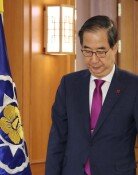Korea, Japan reached a consensus for forced labor victims
Korea, Japan reached a consensus for forced labor victims
Posted January. 14, 2023 07:57,
Updated January. 14, 2023 07:57
Korea and Japan reportedly reached a consensus on creating a foundation for victims of forced mobilization by Imperial Japan at the end of last year. On Thursday, the Korean government officially unveiled a plan to compensate the victims through the Foundation for Victims of Forced Mobilization by Imperial Japan, under the Ministry of the Interior and Safety. And this official announcement could be attributable to its judgment that Japanese firms can contribute to the compensation fund through donations. First, the government will create a foundation funded by businesses that benefited from the 1965 treaty. Then, it is expected to negotiate with the Japanese government regarding the participation of Japanese firms.
A government official familiar with the matter said in a phone call with The Dong-A Ilbo on Friday that the two governments have agreed on this direction saying, “If we are to meet requests from the victims, at a minimum, Japanese companies should contribute to the fund. And we think they would do so.” However, the official said that things are subject to change based on political situations in Japan as this direction is not a final agreement between the two governments. The Japanese government is keeping an eye on public sentiment in Korea, including backlash from victims after the announcement of the Korean government.
The Korean government’s top priority is to engage firms accountable for war crimes, including Mitsubishi Heavy Industries Ltd. and Nippon Steel Corp. to contribute to the fund for compensation. It is because their participation in the form of donations could carry their sincere apologies and convince the victims. However, even if those firms accountable for war crimes don’t participate, large Japanese corporations who agree on improving ties between the two nations could contribute to the fund. The two governments will finalize details such as who will join the fund in what form through negotiations.
How much Japanese companies will contribute is of paramount concern as well. The Korean government hopes to contribute as much as possible, but it needs to be negotiated with the Japanese government. If firms accountable for war crimes don’t participate or compensation does not meet the expectation of the victims, they could refuse to accept it.
Foreign Minister Park Jin and his Japanese counterpart, Yoshimasa Hayashi, exchanged their views on the issue the next day of the government’s official announcement on compensation for victims of forced labor. Japan’s Kyodo News reported that “it seems like Korea’s proposal of compensating Koreans who were enslaved by Japanese companies through a foundation under the Korean government was explained.” Rep. Chung Jin-suk of the ruling People Power Party, the president of the Korea-Japan Parliamentarians’ Union, said during his visit to Japan that the two neighboring countries are in close talks and negotiations to gradually resolve issues regarding the compensation, Japan’s export curb, the General Security of Military Information Agreement (GSOMIA), which is conditionally extended.”
niceshin@donga.com · yea@donga.com
Headline News
- Internal rebellion investigation transferred to Public Prosecutor's Office
- Gov’t to approve Yongin Semiconductor National Industrial Complex
- US conservatives rally around Trump’s third term
- Lee Hyo-song named youngest Rookie of the Year in JLPGA history
- Controversy escalates over the appointment of Constitutional Court justices







